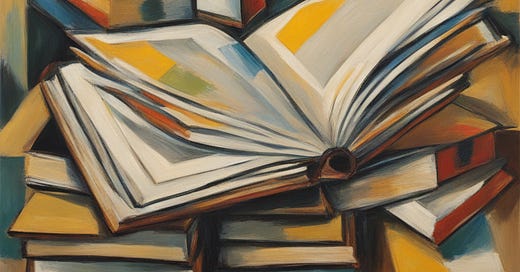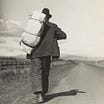By
The Peel District School Board upset a lot of people when it was discovered yesterday that, in the name of Diversity, school libraries are being culled of books published on or before 2008. The culture at PDSB has become so captured by Left-Modernism, the ascendant anti-majority adversarial movement colloquially known as “wokesim,” that they have engaged in a campaign akin to mass book burning. In true Orwellian fashion, they are essentially erasing history - at least, everything on or before 2008. Clearly, this issue deserves a full treatment. However, that is not what I have to offer today.
Instead let's talk about the books, the great books, that we are still free to read to our kids. Let’s also consider the benefits of reading and, as Thomas Sowell has pointed out, the benefits of growing up in a book-lined home. Let’s talk about the love of books - a love that was shared by a far greater segment of the public not so long ago, before the incursion of electronics and the environment of distraction, and mass marketing, and the relentless churn of entertainment. For perhaps a generation or two too long, the immersive and tactile audio-video experience provided by serialized video production, movies, and video games, has intoxicated our imaginations and distracted us away from the literary world, which, on the surface appears to offer little more than a boring array of uniformly sized symbols, black and white, displayed in neat linear sequences, with unit-sized negative spaces peppered throughout separating a variety of drab character combinations.
To a child, text is a poor substitute for the explosive visceral excitement that is at their fingertips, that is, when they are permitted access to tablets, smart phones, laptops, and TVs. I admit I do allow limited access to such devices, but I am vigilant at cutting them off at a certain point regardless of the attitude, drama or theatrics which may ensue as a result. It seems to me that all kids have somewhat addictive personalities and need guidance when it comes to things like moderation. At least mine do. All the more reason I dedicate a lot of time to reading with them. In our house, it goes in all directions - sometimes I’m reading to them, sometimes they are reading to me, and sometimes we separate out the parts and each read one (and perform the appropriate accents and dramatic timbre of course).
Having a lot of books is also key - my house is definitely book-lined, there are many shelves full of books on the many different topics I’ve felt the need to read about over the years. Besides an abundance of non-fiction, there is also literature, philosophy, poetry, and scripture, but until recently the children's section was a little cheezy.
When my kids were really young I used to read hilarious and imaginative stories to them like “The Day the Crayons Quit” or “The Very Hungry Caterpillar” - which is one of the books culled by PDSB, but we are not talking about that nonsense today. I digress. As my kids started learning to read we needed really basic books with basic language - which none of the books in my book-lined home were - so we ended up reading a lot of modern age-appropriate stuff that came from their school. Which was fine, but boring for me, so boring, so mind numbingly monotonous and tedious. I disliked, quite a bit, many of the books that were used to teach them to read.
But my son is now eleven, and my daughter is eight. They are beyond reading 101, they are capable of reading things that are actually interesting. There are great works of fiction that serve the dual purpose of practice in the skill of reading, and the transmission of knowledge about the world. We no longer just read silly stories, we now read great stories. Stories that end up being topics of our conversations - as we discuss our lives we often bring up the characters and situations in the books we read. We also discuss the new ideas and concepts they learn that the stories impart to them.
My daughter and I had a day together a few weeks ago (my son was with his friend for the day), we read an abridged version of Huckleberry Finn. We started in the morning with a few chapters, after lunch a few more, then before bed we finished it. She learned what an abolitionist was, and we discussed at length Huck’s inner conflict with regards to his friend Jim - on the one hand, helping to free Jim (who was a slave) was turning his back on all the people who Huck had ever loved, who had been nice to him or helped him, but on the other hand, he just couldn’t let his friend down, he knew his conscience would never permit it. Jim was his friend.
My son and I are currently taking turns reading “The Legends of Rob Roy” by Leslie Frewin - I’m not exactly sure when it was published, but the copy I have has been in my family since way before my time. The inside cover says “Christmas 1956.” Some parents may feel a book like this is a little too violent for an eleven year old. However, my son is fine with it. He is learning about an important historical period. The Stuart King James VII was deposed in the Glorious Revolution of 1688 and the Highland Clansman of Scotland were enraged about it. Red Rob Roy, fearless leader of the Clan Gregor was a man of honour, a hero, and a leader of his people. To others he was an outlaw. The Legends of Rob Roy are nuanced and complicated, just like life today.
In one chapter, on his return to his home in Inversnaid, after attending to his cattle business, Rob finds that his house has been repossessed by the Duke of Montrose, who ordered his men to burn down the houses of Rob’s neighbours and kin. After assembling in the hills where they had fled, the men, woman and children of the town of Inversnaid listen attentively as Rob takes control:
“First,” he said, “make from the swollen heather, beds for your bairns and womanfolk. Give them food to capture warmth for their cold bodies. When you are done assemble here.”
Then he looked out across the hills, the hills which were littered with the shadows of stars. “Montrose,” he called out while his men watched their leader silently. “Montrose,” he repeated, “the MacGregors are coming!”
“And,” he called out again as his voice rose in anger, “we are coming to lay your possessions and your houses in flames, we are coming to lay Mugdock bare to the ground. From here to the Trongate at Glasgow we will strike down every man who bears you allegiance. But we shall do so in our own way in our own good time. I swear it on the oath of the Clan Gregor!” he cried. And, as the torrent of words poured forth, some eighty assembled men of his clan whipped their dirks from their waists and kissed the cold steel of the blades.
“Montrose,” they repeated almost to a man, “the MacGregors are coming!”
This is how that chapter ended. It was intense to say-the-least, my son and I were really into it. Fully immersed. I read the above climatic stanza with as much drama as I could muster. My voice raised in volume and intensity as I imagined the rage Rob Roy must have felt at having his town raised by his arch enemies. By the time I got to the last line I had worked myself up into a virtual frenzy, I raised my fist in the air and shouted with all of the rage and self-righteous indignation I could conjure - “Montrose… “the MacGregors are coming.”
There was a moment of silence. The curtain on this particular act had fallen. I looked over at my son, who had been hanging on my every word, he said “woah, that was like a movie.” Perfect reading moment with my son, it really was like a movie. The text had utterly transported us to the hillsides of Inversnaid, and we were there with the enraged men of the clan Gregor and we were hungry for our revenge.
I wanted to discuss a bunch of other great books today, but this essay has already gone on for too long. I had planned, in my closing paragraph, to ask if the reader had noticed anything about my book choices. I planned to ever so subtly nudge the reader to the realization that not only are the books I read to my kids older than 2008, the lion share of them are older than the 19th century (The Legends of Rob Roy actually being one of the more recent, in spite of it being publishing sometime circa 1950s).
Anyway, I found this to be a lot of fun (almost as much as reading great literature to my kids), and I definitely want to do it again. So, I will make a little series out of it, and save the other titles for another day.
A last request, dear reader, can you please fill the comments section with the excellent book titles that you and your kids have enjoyed. I would really love to know what they are.
___
Thanks for reading. For More from this author, read From "Double Consciousness" to "Double Crossed"
There are now two ways to support Woke Watch Canada through donations:
1) By subscribing to the paid version of the Woke Watch Canada Newsletter for - $7 Cdn/month or $50 Cdn/year
2) By making a contribution to the Investigating Wokeism In Canada Initiative, which raises the funds necessary to maintain and expand Woke Watch Canada’s research and investigation into Dysfunctional Canadian School Boards, Education, Indigenous Issues, Free Speech, and other areas of Illiberal Subversion and the Canadian Culture Wars.






What a relevant and important post. Allow me to quote here part of a CTV article from four years ago: “An Ontario school board has said that they now “regret” a 2019 educational program that saw books burned and used as fertilizer in the spirit of “reconciliation” — a program that was, in part, led by the co-chair of the Indigenous peoples' commission of the Liberal Party of Canada, who has recently been found not to hold status with Indigenous Services Canada despite claiming otherwise.
The school district, Conseil Scolaire Catholique (CSC) Providence, which operates as the french language school board for southwestern Ontario, originally described the ‘Giving Back To Mother Earth’ program as “a gesture of openness and reconciliation.” Books of quality are being removed, if not burned or slashed (as happened at my school) to create space for more computer screens or banal social justice graphic novels, and of course to avoid offence. James, for kids, the crown for most popular book goes to Holes or Charlie and the Chocolate Factory.
Good.
My pleasure after a day of CBC triggered folly and expletive at the continuing saga of mass hysteria realized in OUR country : "The Giving Tree" by Shel Silverstein 1964, Aesop's Fables, A Child's Christmas in Wales by Dylan Thomas, Harry Potter - "The Prisoner of Azkaban" (NB: The last book of
JK Rowling was used in "family court" to disparage my parenting for reading "scary books at bedtime to frighten the children.")
Bad.
Just heard the babbling brook of Chairman of the Peel District School Board try and talk in circles in obfuscation to David Cochrane's (Power & Politics} repeated queries. There seems no observable merit to be in that executive position, incapable of answering a basic question on "The Diary of Anne Frank" being pulled from school libraries. Complete incompetence without excuse nor reasonable equity claim.
The taxpayer buck stops at Stephen Lecce and so on.